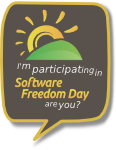 The Open Knowledge Foundation is doing marvellous work in the fields of open data and open content.
The Open Knowledge Foundation is doing marvellous work in the fields of open data and open content.
The Foundation has just published version 2 of its Open Definition. This definition is released under a Creative Commons Attribution licence and is reproduced verbatim below (complete with US spellings and punctuation throughout. Ed.).
Open Definition
Version 2.0
The Open Definition makes precise the meaning of “open” with respect to knowledge, promoting a robust commons in which anyone may participate, and interoperability is maximized.
Summary: Knowledge is open if anyone is free to access, use, modify, and share it — subject, at most, to measures that preserve provenance and openness.
This essential meaning matches that of “open” with respect to software as in the Open Source Definition and is synonymous with “free” or “libre” as in the Definition of Free Cultural Works. The Open Definition was initially derived from the Open Source Definition, which in turn was derived from the Debian Free Software Guidelines.
The term work will be used to denote the item or piece of knowledge being transferred.
The term license refers to the legal conditions under which the work is made available. Where no license has been offered this should be interpreted as referring to default legal conditions governing use of the work (for example, copyright or public domain).
1. Open Works
An open work must satisfy the following requirements in its distribution:
1.1 Open License
The work must be available under an open license (as defined in Section 2). Any additional terms accompanying the work (such as a terms of use, or patents held by the licensor) must not contradict the terms of the license.
1.2 Access
The work shall be available as a whole and at no more than a reasonable one-time reproduction cost, preferably downloadable via the Internet without charge. Any additional information necessary for license compliance (such as names of contributors required for compliance with attribution requirements) must also accompany the work.
1.3 Open Format
The work must be provided in a convenient and modifiable form such that there are no unnecessary technological obstacles to the performance of the licensed rights. Specifically, data should be machine-readable, available in bulk, and provided in an open format (i.e., a format with a freely available published specification which places no restrictions, monetary or otherwise, upon its use) or, at the very least, can be processed with at least one free/libre/open-source software tool.
2. Open Licenses
A license is open if its terms satisfy the following conditions:
2.1 Required Permissions
The license must irrevocably permit (or allow) the following:
2.1.1 Use
The license must allow free use of the licensed work.
2.1.2 Redistribution
The license must allow redistribution of the licensed work, including sale, whether on its own or as part of a collection made from works from different sources.
2.1.3 Modification
The license must allow the creation of derivatives of the licensed work and allow the distribution of such derivatives under the same terms of the original licensed work.
2.1.4 Separation
The license must allow any part of the work to be freely used, distributed, or modified separately from any other part of the work or from any collection of works in which it was originally distributed. All parties who receive any distribution of any part of a work within the terms of the original license should have the same rights as those that are granted in conjunction with the original work.
2.1.5 Compilation
The license must allow the licensed work to be distributed along
with other distinct works without placing restrictions on these other works.
2.1.6 Non-discrimination
The license must not discriminate against any person or group.
2.1.7 Propagation
The rights attached to the work must apply to all to whom it is redistributed without the need to agree to any additional legal terms.
2.1.8 Application to Any Purpose
The license must allow use, redistribution, modification, and compilation for any purpose. The license must not restrict anyone from making use of the work in a specific field of endeavor.
2.1.9 No Charge
The license must not impose any fee arrangement, royalty, or other compensation or monetary remuneration as part of its conditions.
2.2 Acceptable Conditions
The license shall not limit, make uncertain, or otherwise diminish the permissions
required in Section 2.1 except by the following allowable conditions:
2.2.1 Attribution
The license may require distributions of the work to include attribution of contributors, rights holders, sponsors and creators as long as any such prescriptions are not onerous.
2.2.2 Integrity
The license may require that modified versions of a licensed work carry a different name or version number from the original work or otherwise indicate what changes have been made.
2.2.3 Share-alike
The license may require copies or derivatives of a licensed work to remain under a license the same as or similar to the original.
2.2.4 Notice
The license may require retention of copyright notices and identification of the license.
2.2.5 Source
The license may require modified works to be made available in a form preferred for further modification.
2.2.6 Technical Restriction Prohibition
The license may prohibit distribution of the work in a manner where technical measures impose restrictions on the exercise of otherwise allowed rights.
Non-aggression
The license may require modifiers to grant the public additional permissions (for example, patent licenses) as required for exercise of the rights allowed by the license. The license may also condition permissions on not aggressing against licensees with respect to exercising any allowed right (again, for example, patent litigation).
 Language is dynamic, constantly mutating and changing. One sign of this dynamism is the appearance of neologisms, i.e. newly coined word, or phrases or familiar words used in a new sense.
Language is dynamic, constantly mutating and changing. One sign of this dynamism is the appearance of neologisms, i.e. newly coined word, or phrases or familiar words used in a new sense. EU open source news site
EU open source news site  Hamburg’s Green want to wean the city council off its Microsoft dependency and are pointing to Munich city council’s use of Linux and free and open source software, German IT news website
Hamburg’s Green want to wean the city council off its Microsoft dependency and are pointing to Munich city council’s use of Linux and free and open source software, German IT news website  On the occasion of the impending
On the occasion of the impending  The
The 

 It’s under a week to
It’s under a week to